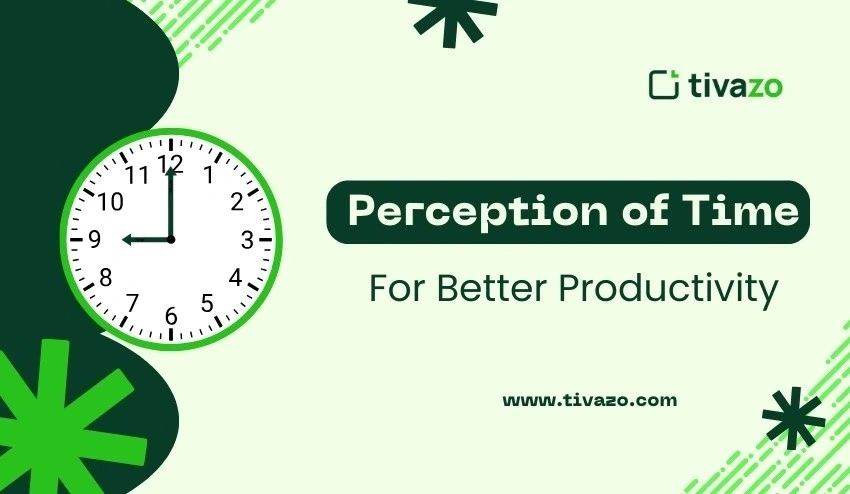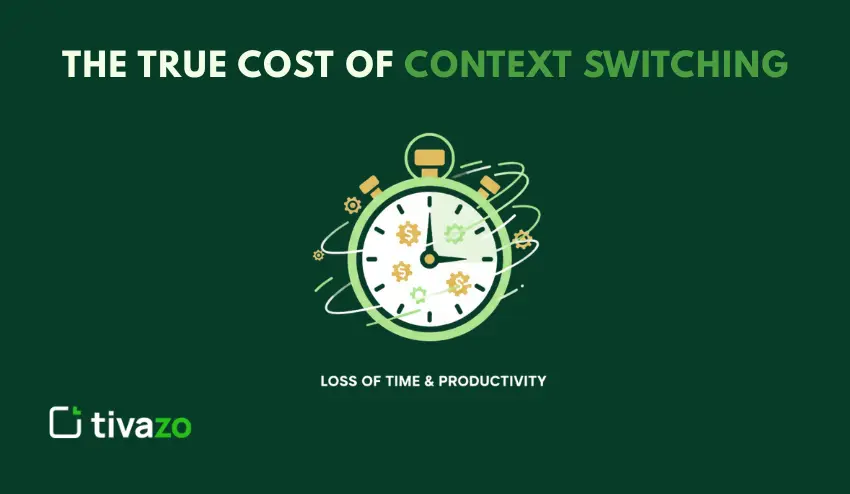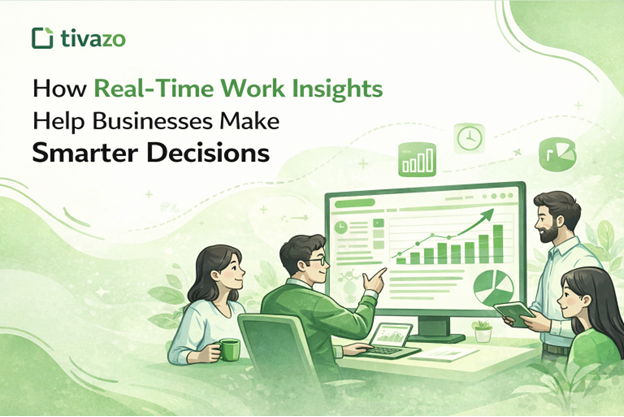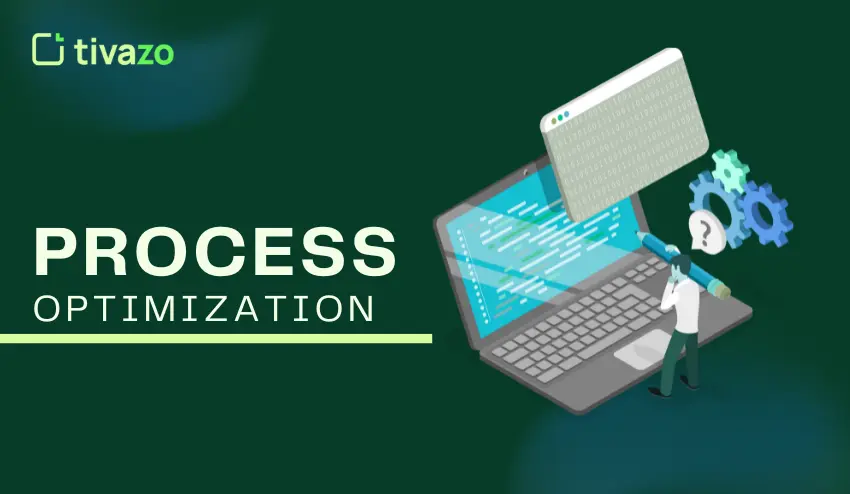Have you ever experienced time slipping away, no matter how hard you’re trying to stay on top of it? (Perhaps it’s at work where you’re multitasking, or maybe it’s just life you’re trying to balance). Time can be both your friend or enemy. In fact, the way we perceive, manage, and interpret time is powerful since our perception of time greatly influences our productivity, stress, and overall well-being. But what if it was possible to conquer your perception of time and increase your productivity with AI?
In this blog, we’ll examine how time perception and management are evolving through artificial intelligence (AI). AI provides us with intelligent methods to manage our tasks smarter, therefore relieving our stress surrounding time management and productivity. Let’s get started.
Key Highlights:
- What Is Perception of Time
- Impact of Time Perception on Your Productivity
- AI Can Improve Your Perception of Time
- AI-Driven Ways to Master Your Perception of Time
- Science Behind Perception of Time
- Link Between Time Perception and Stress
- Technology is Changing Our Perception of Time
What Is Perception of Time?
Time perception is how we perceive, interpret, and manage time in our minds. Interestingly, time does not progress at the same rate for everyone. The timing of events, age, environment, stress, emotional state, and moods impact our perception of time. For example, enjoying something instantly propels time forward; meanwhile, we can often become the longest moments of our lives are spent that stressed.
This subjective experience of time can greatly affect how we plan day-to-day tasks, and the effect on productivity can be massive. The good news is that AI can help change our perception of time and, therefore, improve our time management and focus.
The Impact of Time Perception on Your Productivity
How we perceive and experience time affects how we engage with tasks and how we manage that load. When we are skewed on how we perceive time, whether this might be underestimating how long something will take, or feeling daunted by the ticking clock, we have difficulty with productivity.
Here’s how distorted time perception can hurt your performance:
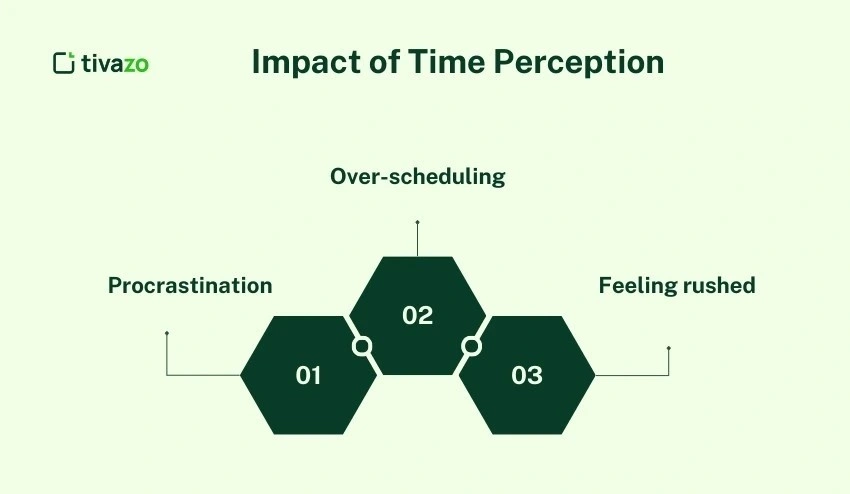
- Procrastination: Underestimating how long a task will take often leads to procrastination until the last possible second.
- Over-scheduling: We overestimate how much we can accomplish in a small amount of time, which leads to failure.
- Feeling rushed: Miscalculating time leads to lots of stress and rushed decision-making.
When we have agency over how we perceive time, we can make better decisions and behave in a more controlled, planned, and ultimately productive manner.
How AI Can Improve Your Perception of Time
AI is already disrupting many facets of our lives, including how we manage time. AI offers the ability to collect real-time data, use predictive analytics, and provide intelligent reminders to help achieve a more accurate and clearer sense of time.
Below are various ways AI can help improve your sense of time:
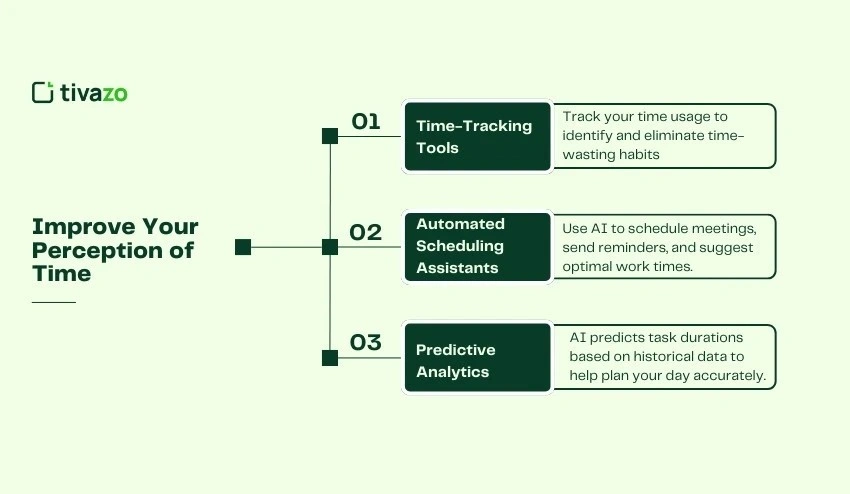
- Time-Tracking Tools: Applications like Tivazo show how you spend your time throughout the day and reveal some of those time-wasting habits. They provide you with insight into how much time you are actually spending on different tasks.
- Automated Scheduling Assistants: AI assistants such as Google Assistant and Siri can help you schedule meetings, send reminders, and, in certain instances, even suggest the best times for you to get to work based on your habits or previous engagements.
- Predictive Analytics: AI tools can predict how long tasks will take based on past information. An example of this would be taking historical data and helping you accurately plan your day, avoiding dreadful overestimation or worse, horrible underestimation.
With tools of AI, we can also reclaim our faulty perception of time while increasing our ability to manage time better.
5 AI-Driven Ways to Master Your Perception of Time
5 AI-Driven Ways to Master Your Perception of Time are:
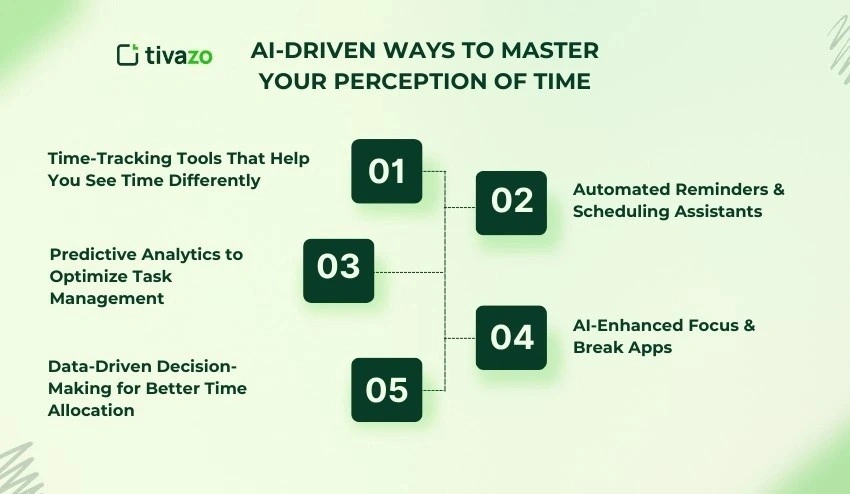
1. Time-Tracking Tools That Help You See Time Differently
Take a look at a time-tracking app called Tivazo. The app can provide you with insights into how much time you spend on activities during the day. Dysfunctional time perception is sometimes driven by misconceptions about the amount of time we spend on activities. Time-tracking apps, like Tivazo, will provide reports to show you your time usage so you can identify some patterns in your time perception. You may realize you spend too much time on social media, or you are constantly underestimating how long you spend on things like everyday tasks.
2. Automated Reminders & Scheduling Assistants
AI tools, like Google Calendar, Alexa, and others, are able to send you automated reminders 10 minutes, or whatever increment you want, before upcoming tasks, meetings, and obligations, helping to keep you on track. AI tools can also automatically give you reminders for tasks organized on a calendar at the best possible time for you, so that you do not book yourself too tightly, and eliminate your ability to forget, as you will be reminded about your important obligations.
3. Predictive Analytics to Optimize Task Management
AI task management applications like Todoist or Trello use predictive analytics to evaluate how long it will take you to complete a task based on your previous activity. This allows you to prioritize tasks that you can realistically accomplish, ultimately providing a more accurate way to allocate time to tasks while avoiding over-committing and the distortion of time.
4. AI-Enhanced Focus & Break Apps
Apps like Focus@Will or Focus Booster use AI to enhance your work and breaks to handle your productivity habits. These applications use algorithms to help evaluate the time response to working periods and break periods, adhering to an appropriate plan to ensure time has been accommodated during the work day, while avoiding overworking to the point of burnout.
5. Data-Driven Decision-Making for Better Time Allocation
AI can help determine where you should be spending your time to be more effective by analyzing your past and making recommendations based on previous work habits. Metrics like allocator analysis that tell you which tasks were most successful for the duration of effort, allow the user to set a numerical value and a positive outcome that prioritize high-leverage tasks over only making progress on less productive tasks.
The Science Behind Perception of Time: Why We Experience It Differently
By understanding the science of time perception, we can gain insight into why we experience time the way we do. Research indicates the perception of time strongly relates to attention, emotions, and memory. For instance, when we are highly engaged or concentrated on a task, we perceive time to be flying past, while boredom or distraction tend to make it feel very slow-moving.
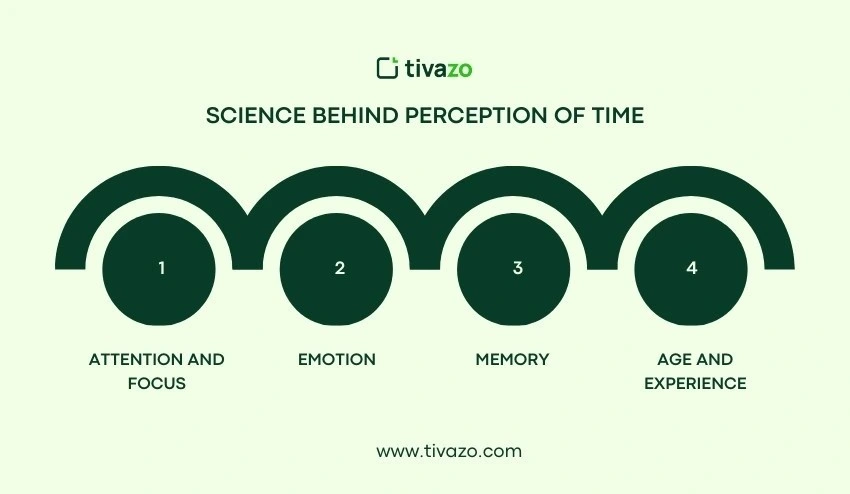
Attention and Focus:
- Paying close attention to a task makes time seem to pass quicker. Distractions that take away your attention, make time feel longer.
Emotion:
- Positive emotions tend to make time go quickly, while negative emotions (stress or boredom) make time feel longer.
Memory:
- If you reference your day afterward, a very busy, enjoyable day may feel like it was short, while a day that was slow and uneventful may feel like it lasted long.
Age and Experience:
- As you age, time seems to speed up, thanks in part to fewer novel experiences.
Overcoming Time Distortions: How AI Can Help You Stop Wasting Time
On more than one occasion, time slips away as the result of distractions or procrastination. AI can help eliminate distortions of time by providing real-time feedback and working definitions of task management. Applications like RescueTime and Toggl track what you do with your time, and provide alerts when you are wasting time on low-prioritized tasks and when they keep you from doing the things you need to do. AI task management, like Trello or Asana, automates scheduling, reminders, and prioritizing your overall work will keeping you always working on the right tasks.
Focus Apps like Focus@Will use various AI functions to block distractions and define work-break cycles that optimize focus time. Finally, smart scheduling like Google Calendar learn when your time chip aligns with your most productive times of the day that aligning tasks with your peak productivity hours. With AI, you can stay on track, minimize, if not avoid distractions, and better optimize your workday.
The Link Between Time Perception and Stress: How AI Can Relieve Pressure
When people’s time perception is skewed they start to experience higher levels of stress. When we feel rushed and overwhelmed, we start to make bad decisions and struggle to meet deadlines. AI can relieve stress in the way you plan your day, set realistic goals, and automate regularly repetitive work to relieve the mental amount of load and stress that accompanies time mismanagement.
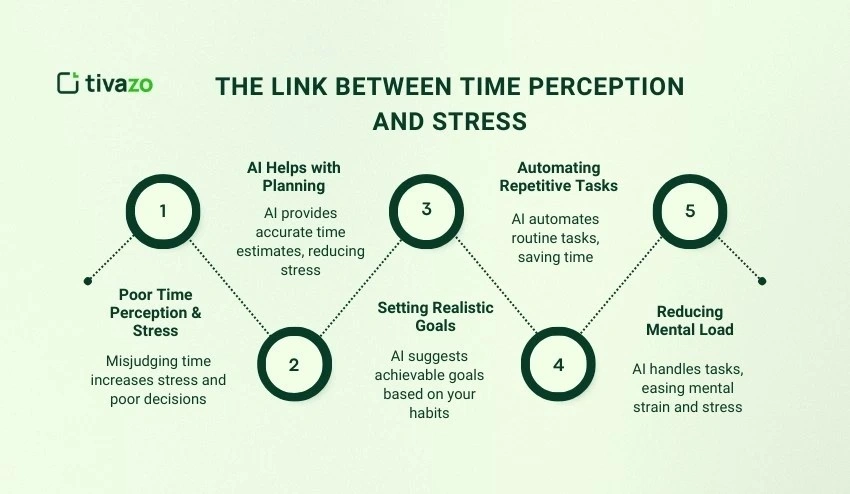
- Poor Time Perception & Stress
When people inaccurately estimate how much time tasks will take or believe time is “slipping away” we often become more stressed. In these situations we also often find ourselves in a cycle of feeling rushed and/or overwhelmed which leads to poor decisions and an inability to meet deadlines. - AI Helps with Planning
AI tools will help you plan your day more realistically and give you a sense of how long your tasks will actually take. With improved time estimations you can reduce the chances of over-scheduling your work and help lessen the anxiety of trying to cramming in too much work in not enough time. - Setting Realistic Goals
AI creates achievable goals, much more than we can alone, by reviewing our work habits and recommending reasonable deadlines. By knowing what is possible to clearly see you will cutout the pressure created from unrealistic expectations. - Automating Repetitive Tasks
Stress can stem from mental load associated with repetitive tasks, like setting up meetings or handling everyday emails. Digital first-aid can automate those repetitive tasks, allowing you more time and energy to devote to something more meaningful. - Reducing Mental Load
When AI handles your time, task prioritization, and mundane tasks, it reduces the amount of mental load you carry during the day. Instead of getting caught up in minutia in your busy workdays, the AIs reduce tasks that don’t have a lot of meaningful reward, which can add up to less overall stress when you deal with information overload and feeling scattered!
Mastering Time Perception: 3 Myths You Should Stop Believing
When it comes to managing time effectively, it is very easy to fall into the trap of believing common myths surrounding time management and effective productivity. These myths often result in bad time management strategies and increase stress. Below, we will explore three myths related to time perception and discover how AI can help us make effective and smarter choices in regards to managing time.
- Myth 1: Multitasking Increases Efficiency
Fact: Research has shown that multitasking ultimately leads to lower productivity levels and higher incidences of mistakes and/or errors. AI can assist us with focusing on a single task promptly when distractions are removed and workflows are streamlined. - Myth 2: Time Management Is All About Planning
Fact: Creating a plan is part of time management. However, it is just as important to be flexible and adaptive. AI tools can help us dynamically adjust plans and requirements when needed. - Myth 3: We Have More Control Over Time Than We Think
Fact: Time is ultimately out of our control. However, through increasingly better time management stats, which may include AI in the process, we can maximize the effectiveness of time.
How Technology is Changing Our Perception of Time
Technology has changed the way we experience time. Ever since smartphones, apps, and AI tools came on the scene, we have been inundated with notifications that impact how we perceive time and manage time. Technology has had relational impacts on stress and distractions we have with time, but has also helped us manage time more effectively. Here are four possible ways Technology impacts our perception of time:
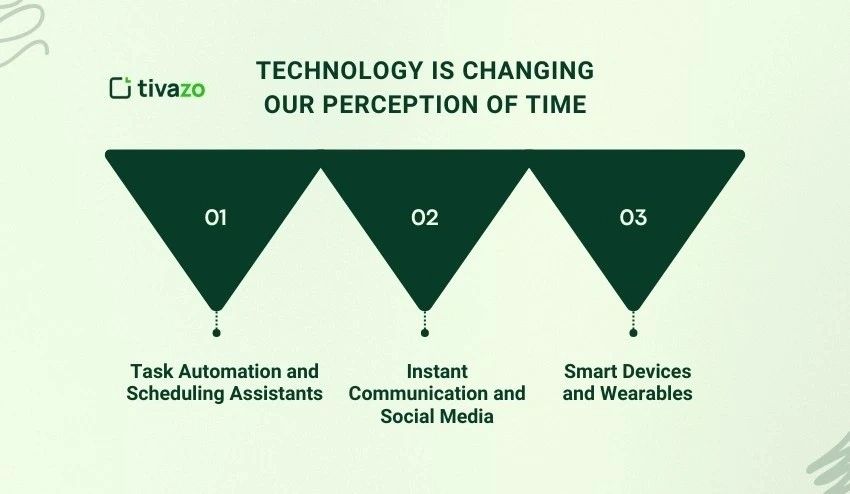
- Task Automation and Scheduling Assistants:
- Google Assistant or Siri allows you to schedule tasks that are repetitive or automate entire processes. Technology frees up mental space, allows for organization, decreases stress associated with time, and increases efficiency.
- Instant Communication and Social Media:
- With an endless supply of instant messages and social media updates and notifications, time appears to go by quicker than it ever has. We lose track of time or feel rushed like never before.
- Smart Devices and Wearables:
- Various smart devices, such as smartphones and smartwatches, track our physical activity and daily lives. This produces usable data that we can use to manage our health and better organize, optimizing our time and time management.
Conclusion
By improving your feelings and perception of time, you can substantially boost productivity, relieve stress, and overall quality of life. You have the potential to eliminate time distortion using AI tools that could help you log, plan, and optimize the time you utilize. There’s no reason that you shouldn’t expand your use of this great tool that can easily give you back an awareness of how you manage time. Don’t squander any more time integrate the AI tools into your rhythm today to fundamentally define your relationship with time.
